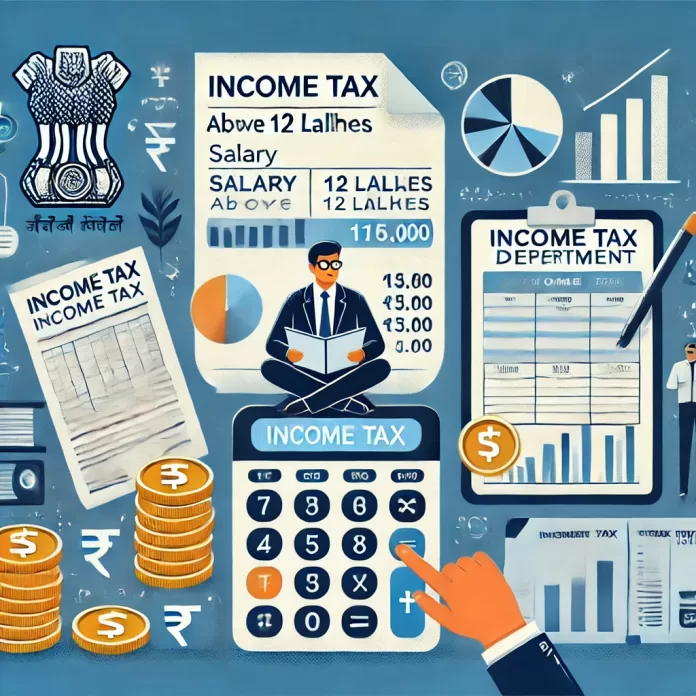Understanding How to Calculate Tax on your salary can seem like a daunting task, but it doesn’t have to be! Whether your salary is above 12 lakhs or below, it’s important to understand the tax structure to ensure you’re not overpaying or missing any deductions. Let’s break down the process for people earning above 12 lakhs and also look at who doesn’t need to pay taxes if their salary is below 12 lakhs.
Tax Calculation for Salary Above 12 Lakhs
If your annual salary is above ₹12 lakhs, you fall into a higher tax bracket under the Indian Income Tax system. Here’s a step-by-step guide to calculating your tax:
1. Determine Your Total Income
The first step is calculating your total income. This includes:
- Basic Salary
- Bonuses
- Allowances
- Perks
- Any other income (e.g., rental income, interest, etc.)
2. Claim Deductions
The next step is to apply any eligible deductions under Section 80C to 80U. Some of the common deductions include:
- Section 80C: Investments in PPF, ELSS, NSC, etc. (maximum deduction ₹1.5 lakhs)
- Section 80D: Health insurance premiums (for self and family)
- Section 24(b): Deduction on home loan interest (up to ₹2 lakhs)
Deductions reduce your taxable income, and you only pay tax on the income remaining after applying these deductions.
3. Apply the Income Tax Slabs
Once you’ve deducted eligible amounts from your total income, you can apply the appropriate tax slabs for individuals below 60 years (as per the latest tax slabs for FY 2024-25). Here’s the breakdown:
- Income up to ₹2.5 lakh: No tax
- Income from ₹2.5 lakh to ₹5 lakh: 5%
- Income from ₹5 lakh to ₹10 lakh: 20%
- Income above ₹10 lakh: 30%
Example:
If your salary is ₹15 lakhs and after deductions (e.g., ₹2 lakhs in deductions), your taxable income is ₹13 lakhs, the tax calculation will look like this:
- First ₹2.5 lakh → No tax
- Next ₹2.5 lakh (₹2.5 lakh to ₹5 lakh) → 5% = ₹12,500
- Next ₹5 lakh (₹5 lakh to ₹10 lakh) → 20% = ₹1,00,000
- Remaining ₹3 lakh (₹10 lakh to ₹13 lakh) → 30% = ₹90,000
Total tax = ₹12,500 + ₹1,00,000 + ₹90,000 = ₹2,02,500
In addition to this, you may also be liable for a cess of 4% on the total tax amount, which is ₹8,100 in this case.
Final Tax Payable = ₹2,02,500 + ₹8,100 = ₹2,10,600
4. Rebate Under Section 87A (If Applicable)
If your taxable income is below ₹5 lakh after deductions, you may be eligible for a rebate of up to ₹12,500 under Section 87A, which can reduce your tax liability. However, since your salary is above ₹12 lakhs, this rebate doesn’t apply.
Who Doesn’t Need to Pay Tax if Salary is Below ₹12 Lakhs?
For individuals earning below ₹12 lakhs, tax liability depends on their total income and eligibility for deductions. Here are the basic thresholds:
- Income up to ₹2.5 lakh: No tax is levied on annual income up to ₹2.5 lakh.
- Income between ₹2.5 lakh and ₹5 lakh: Tax is applicable, but it is reduced by a rebate of ₹12,500 under Section 87A. This means individuals earning between ₹2.5 lakh and ₹5 lakh essentially pay no tax after the rebate.
- Income between ₹5 lakh and ₹10 lakh: This group falls under the 20% tax bracket. However, after deductions, the tax may be considerably lower or even nil, depending on eligible exemptions and deductions.
- Income between ₹10 lakh and ₹12 lakh: Individuals falling into this category are taxed at 30%. But, again, deductions under Section 80C and other exemptions can reduce the tax liability substantially.
Key Takeaway: If your salary is below ₹2.5 lakh, you’re exempt from paying any taxes. Those earning between ₹2.5 lakh and ₹5 lakh may not pay taxes due to rebates, and anyone below ₹12 lakh may have a reduced tax burden thanks to various deductions.
Tax calculations can seem complicated, but once you break it down into manageable steps, it becomes easier to understand. If your salary is above ₹12 lakhs, ensure you take advantage of all available deductions and exemptions to minimize your tax liability. For those earning less, there’s a chance you might not owe any tax at all depending on your income and deductions.
Always stay updated with the latest tax laws and consult a tax professional to optimize your tax strategy and avoid any surprises!














